Filter by

Managing meaning in Ukraine :information, communication, and narration since …
"This book shows how confusion resulting from conflicts in Ukraine have repeatedly created the urgent need for meaning in a chaotic situation. Focusing on Ukraine in the aftermath of the so-called Euromaidan revolution in late 2013 and up through the present Russian invasion, this book analyzes how meaning is made as a nation seeks to control its image at home and especially abroad"--OCLC-licen…
- Edition
- -
- ISBN/ISSN
- 9780262374576
- Collation
- 1 online resource.
- Series Title
- -
- Call Number
- -

Reflections on water :new approaches to transboundary conflicts and cooperation
This book offers conceptual and empirical support for the idea that the human relationship with water must move beyond rationalist definitions of water as product, property, and commodity.OCLC-licensed vendor bibliographic record.
- Edition
- -
- ISBN/ISSN
- 9780262268660
- Collation
- 1 online resource (xvi, 358 pages) :illustrations, maps.
- Series Title
- -
- Call Number
- -
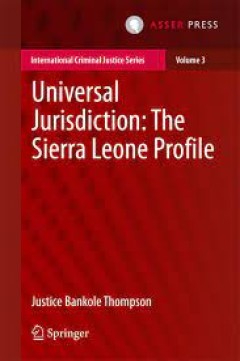
Universal Jurisdiction: The Sierra Leone Profile
The doctrine of universal jurisdiction has evolved throughout modern times in the context of global criminal justice as a paramount agent of combating impunity emanating from international criminality. Sierra Leone, as a member of the international community and the United Nations, has, in recent times, been a pioneer in the progressive application and development of international criminal law …
- Edition
- -
- ISBN/ISSN
- 978-94-6265-054-1
- Collation
- -
- Series Title
- -
- Call Number
- -
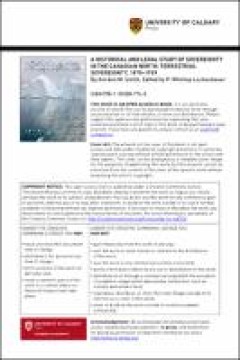
A Historical and Legal Study of Sovereignty in the Canadian North: Terrestria…
Gordon W. Smith, PhD, dedicated much of his life to researching Canada's sovereignty in the Arctic. A historian by training, his 1952 dissertation from Columbia University on "The Historical and Legal Background of Canada's Arctic Claims" remains a foundational work on the topic, as does his 1966 chapter "Sovereignty in the North: The Canadian Aspect of an International Problem," in R. St. J. M…
- Edition
- Ed. 1
- ISBN/ISSN
- 9781552387740, 9781552387740
- Collation
- 512
- Series Title
- Northern Lights
- Call Number
- 920 HIS h
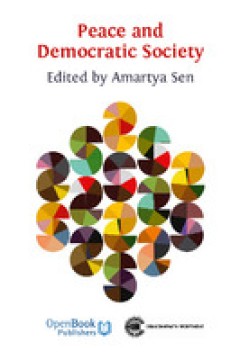
Peace and Democratic Society
Recent acts of terrorism and the current unrest in the Middle East remind us how important it is to understand the relationship between violence, peace and democracy. In a challenging and insightful essay, Amartya Sen explores ideas around 'organised violence' (such as war, genocide and terrorism) and violence against the individual. Highlighting the inadequacies of some of the widely accepted …
- Edition
- Ed. 1
- ISBN/ISSN
- 9781906924393
- Collation
- 155
- Series Title
- Open Reports Series
- Call Number
- 303.6 PEA p
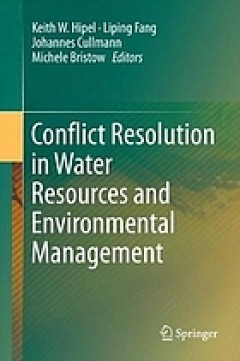
Conflict Resolution in Water Resources and Environmental Management
The latest developments regarding the theory and practice of effectively resolving conflict in water resources and environmental management are presented in this book by respected experts from around the globe. Water conflicts are particularly complex and challenging to solve because water and environmental issues span both the societal realm, in which people and organizations interact, and the…
- Edition
- -
- ISBN/ISSN
- 9783319142159
- Collation
- vii, 291 pages
- Series Title
- -
- Call Number
- 303.6

Interactive Peacemaking A People-Centered Approach
This book examines the theory and practice of interactive peacemaking, centering the role of people in making peace. The book presents the theory and practice of peacemaking as found in contemporary processes globally. By putting people at the center of the analysis, it outlines the possibilities of peacemaking by and for the people whose lives are touched by ongoing conflicts. While considerin…
- Edition
- -
- ISBN/ISSN
- 9781000551884
- Collation
- -
- Series Title
- -
- Call Number
- -

The Politics of Bad Options Why the Eurozone's Problems Have Been So Hard to…
Why did the Eurozone crisis prove to be so difficult to resolve? Why was it resolved in a manner in which some countries bore a much larger share of the pain than other countries? Why did no country leave the Eurozone rather than implement unprecedented austerity? Who supported and who opposed the different policy options in the crisis domestically, and how did the distributive struggles among …
- Edition
- -
- ISBN/ISSN
- 9780198857013
- Collation
- -
- Series Title
- -
- Call Number
- -
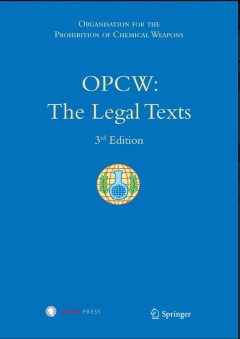
OPCW: The Legal Texts
The Convention on the Prohibition of the Development, Production, Stockpiling and Use of Chemical Weapons and on Their Destruction (CWC), which entered into force on 29 April 1997, bans an entire category of weapons of mass destruction. The CWC has now been in force for almost twenty years and having 190 States Parties as at July 2014, has almost achieved universal adherence. To achieve its obj…
- Edition
- 3
- ISBN/ISSN
- 978-94-6265-043-5
- Collation
- XXII, 783
- Series Title
- -
- Call Number
- -
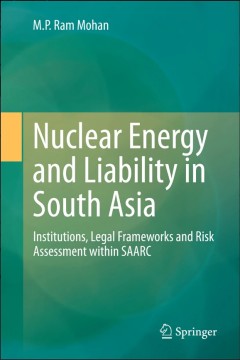
Nuclear Energy and Liability in South Asia:Institutions, Legal Frameworks and…
This book advocates pursuing a regional approach to nuclear risk framework, which it argues is more promising in the current scenario than the non-achievable global regime. In the development of international legislation on liability, the nuclear energy sector represents an alternative approach to a transboundary liability regime. Building on this foundation and following the Chernobyl accident…
- Edition
- 1
- ISBN/ISSN
- 978-81-322-2342-9
- Collation
- Number of Pages XIX, 142
- Series Title
- -
- Call Number
- -
 Computer Science, Information & General Works
Computer Science, Information & General Works  Philosophy & Psychology
Philosophy & Psychology  Religion
Religion  Social Sciences
Social Sciences  Language
Language  Pure Science
Pure Science  Applied Sciences
Applied Sciences  Art & Recreation
Art & Recreation  Literature
Literature  History & Geography
History & Geography